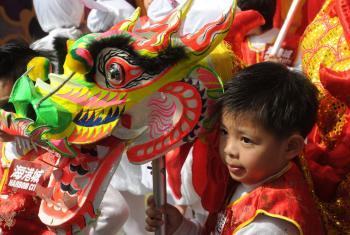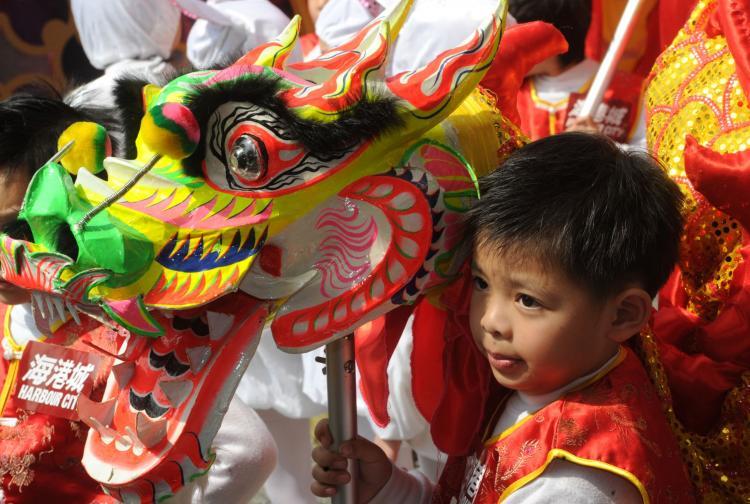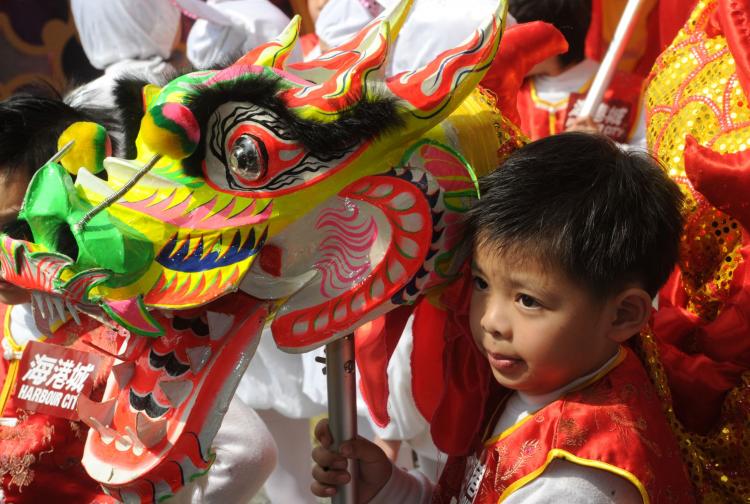Chinese consider the lunar New Year as one of the most important traditional holidays, regardless of which part of the country they’re from. This is the season when families reunite and friends gather to celebrate.
Regarding the origin of the Chinese New Year, a legend says that its celebrations are related to a beast named Nian, which was known for its cruelty. In ancient times, people believed that the beast Nian came out on New Year’s Eve to feed on people. It was said to fear the color red, flames, and noise.
Throughout history, people would decorate their front doors with poetic spring couplets in black ink on red sheets. They would light torches and set off firecrackers the entire night of New Year’s Eve. On the morning of New Year’s Day, they would congratulate each other with joy and excitement for having scared away the beast Nian.
Some people tend to think that Chinese New Year celebrations start on New Year’s Eve. However, they start as early as on the 24th day of the final month in the Chinese lunar calendar. According to a legend, on this day deities return to the celestial palace to report the past year’s developments to the Jade Emperor.
Families spend the day preparing offerings on the altar’s table to pay tribute to the deities, while burning spirit money, which is meant to cover travel expenses for these deities traveling back to the celestial palace. In addition, people smear syrup around the portrait of the deity in charge of the kitchen, so that he will sugar-coat his words when reporting to the Jade Emperor.
Whoever has to live or work out of town tries his best to get back home on or before New Year’s Eve to join the family for the abundant dinner on the final day of the year. This is the time when adults give red packets filled with money to children. The whole family stays up late past midnight to greet the arrival of the New Year.
A legend says that staying up past midnight on New Year’s Eve can increase longevity of one’s parents. It is not unusual that people stay up the entire night, lighting up lanterns and setting off firecrackers, which drives off the beast Nian and other bad spirits.
Some families hold religious ceremonies after midnight. The ceremonies often end by igniting a long string of firecrackers to welcome the New Year.
On New Year’s Day people first of all honor their ancestors and pay tribute to various deities. Younger members of the family must make a New Year’s call to members of the older generations. Then people visit their friends and greet each other to be prosperous in the New Year. It is an opportune moment to reach reconciliation, so that old scores can be settled with the passing of the old year.
Traditionally during the Chinese New Year dragon and lion dances are performed. Dragons, an auspicious symbol in Chinese history, are considered to be in charge of rainfalls. A dragon dance is meant to pray for a year of mild wind and moderate rain, which is necessary for a good harvest. Both dragons and lions are also believed to be powerful to drive away demons and bad spirits.
Like with other festivals, food plays a major role during the Chinese New Year. People prepare dishes that excel ordinary food in color, fragrance, and flavor. Besides rewarding everyone for working hard in the past year, people regard certain dishes as auspicious for the beginning of the New Year.
For example, fish is a must in the abundant dinner on New Year’s Eve. The Chinese character for “fish” sounds like “extra” or “leftover,” which symbolizes “extra savings” or “abundance in each year.” “Chives” in Chinese sounds like and symbolizes “forever.” Fish balls and meat balls—because of their round shape—stand for family reunion, as “round” and “reunion” share the same pronunciation.
Other favorite dishes include New Year’s rice cake, which sounds like “getting promotion” or “moving upward,” while dumplings look like shoe-shaped gold ingots, an auspicious symbol for the accumulation of a family’s wealth in the New Year.
[email protected]
Regarding the origin of the Chinese New Year, a legend says that its celebrations are related to a beast named Nian, which was known for its cruelty. In ancient times, people believed that the beast Nian came out on New Year’s Eve to feed on people. It was said to fear the color red, flames, and noise.
Throughout history, people would decorate their front doors with poetic spring couplets in black ink on red sheets. They would light torches and set off firecrackers the entire night of New Year’s Eve. On the morning of New Year’s Day, they would congratulate each other with joy and excitement for having scared away the beast Nian.
Some people tend to think that Chinese New Year celebrations start on New Year’s Eve. However, they start as early as on the 24th day of the final month in the Chinese lunar calendar. According to a legend, on this day deities return to the celestial palace to report the past year’s developments to the Jade Emperor.
Families spend the day preparing offerings on the altar’s table to pay tribute to the deities, while burning spirit money, which is meant to cover travel expenses for these deities traveling back to the celestial palace. In addition, people smear syrup around the portrait of the deity in charge of the kitchen, so that he will sugar-coat his words when reporting to the Jade Emperor.
Whoever has to live or work out of town tries his best to get back home on or before New Year’s Eve to join the family for the abundant dinner on the final day of the year. This is the time when adults give red packets filled with money to children. The whole family stays up late past midnight to greet the arrival of the New Year.
A legend says that staying up past midnight on New Year’s Eve can increase longevity of one’s parents. It is not unusual that people stay up the entire night, lighting up lanterns and setting off firecrackers, which drives off the beast Nian and other bad spirits.
Some families hold religious ceremonies after midnight. The ceremonies often end by igniting a long string of firecrackers to welcome the New Year.
On New Year’s Day people first of all honor their ancestors and pay tribute to various deities. Younger members of the family must make a New Year’s call to members of the older generations. Then people visit their friends and greet each other to be prosperous in the New Year. It is an opportune moment to reach reconciliation, so that old scores can be settled with the passing of the old year.
Traditionally during the Chinese New Year dragon and lion dances are performed. Dragons, an auspicious symbol in Chinese history, are considered to be in charge of rainfalls. A dragon dance is meant to pray for a year of mild wind and moderate rain, which is necessary for a good harvest. Both dragons and lions are also believed to be powerful to drive away demons and bad spirits.
Like with other festivals, food plays a major role during the Chinese New Year. People prepare dishes that excel ordinary food in color, fragrance, and flavor. Besides rewarding everyone for working hard in the past year, people regard certain dishes as auspicious for the beginning of the New Year.
For example, fish is a must in the abundant dinner on New Year’s Eve. The Chinese character for “fish” sounds like “extra” or “leftover,” which symbolizes “extra savings” or “abundance in each year.” “Chives” in Chinese sounds like and symbolizes “forever.” Fish balls and meat balls—because of their round shape—stand for family reunion, as “round” and “reunion” share the same pronunciation.
Other favorite dishes include New Year’s rice cake, which sounds like “getting promotion” or “moving upward,” while dumplings look like shoe-shaped gold ingots, an auspicious symbol for the accumulation of a family’s wealth in the New Year.
[email protected]



